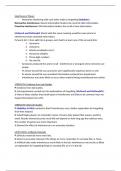Summary
Summary AQA A level psychology paper 1 memory, interference as an explanation for forgetting
- Module
- Memory (PSYCH101)
- Institution
- AQA
This document contains revision notes for interference as an explanation for forgetting for AQA A level psychology for the topic of memory in paper 1. All content follows the AQA specification.
[Show more]



